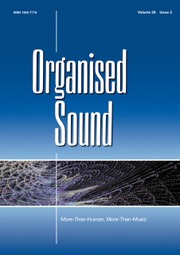Article contents
‘Nature’ as an Organising Principle: Approaches to chance and the natural in the work of John Cage, David Tudor and Alvin Lucier
Published online by Cambridge University Press: 06 July 2010
Abstract
This paper contrasts three composers’ relationships with the ‘natural’ and the uses of chance in electroacoustic works which follow from these relationships. John Cage is well known for use of chance methods as an organising principle in his works from the early 1950s onward, based on a professed desire to reflect ‘nature’ in art. Cage’s close colleague David Tudor presents a quite different relationship to the ‘natural’ in his live-electronic music, showing distinctly non-Cageian uses of chance means. Alvin Lucier, whose interaction with Cage and Tudor as a young ‘experimental’ composer was important, frequently describes his work as having a close connection to the ‘natural’, but shows a third quite different way of allowing this relationship to inform his work.
- Type
- Articles
- Information
- Organised Sound , Volume 15 , Issue 2: Organising electroacoustic music , August 2010 , pp. 133 - 136
- Copyright
- Copyright © Cambridge University Press 2010
References
- 5
- Cited by


